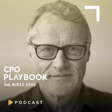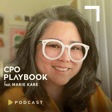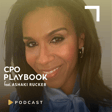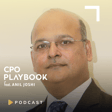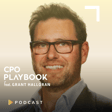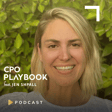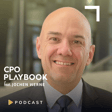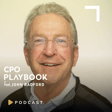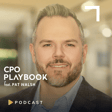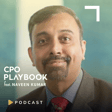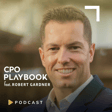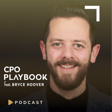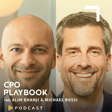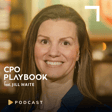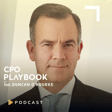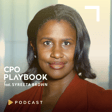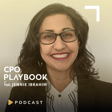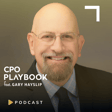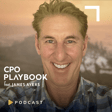Become a Creator today!Start creating today - Share your story with the world!
Start for free
00:00:00
00:00:01

HR Technology Conference on AI and More (Part 2)
In Part 2 of our episode series, we dive deep into the critical topics of fairness, benefits, and HRIS systems. Join us as we analyze the contributions of established giants like IBM and Workday alongside emerging players striving to make their mark in the HR landscape. We also spotlight companies that are expanding their product offerings to address the changing demands in the HR landscape. Discover how these elements are being enhanced in the HR industry and gain valuable insights into the latest trends in HR technology. Whether you're interested in HR solutions or best practices, this episode provides a comprehensive look at how fairness and benefits in HR systems are evolving to meet the needs of today’s workforce.
Transcript
Introduction to CPO Playbook Podcast
00:00:05
Speaker
Hello everyone. I'm Felicia Shakiba, and you're listening to the CPO Playbook Podcast. Join me and my guests as we feature insightful conversations with HR leaders, people scientists, and executives from diverse industries and functions, offering valuable perspectives on the future of work.
00:00:23
Speaker
Discover a unique outlook on navigating the complexities of the modern-day working world. Exploring innovative strategies in talent management and corporate culture from the chief people officer's perspective. Tune in to stay ahead of the game when it comes to all things people related.
HR Tech Conference Part 2 Highlights
00:00:44
Speaker
Welcome to Part 2 of the HR Tech Conference Highlights, broadcast from the bustling arena of Mandalay Bay in Las Vegas. In our previous segment, we unveiled cutting-edge technologies capable of generating substantial cost savings for companies
00:01:02
Speaker
enhancing productivity, promoting organizational transparency, skill validation in the workplace, and expediting role fulfillment. In this week's edition, we thoroughly explore the world of compliance management, a task often postponed by many companies, yet necessary to retain talent and, well, stay in business.
00:01:25
Speaker
We also explore the ambitious endeavors of human capital and HR information systems, also known as HRIS, as they integrate extensive functionalities into their technology solutions. These are the HR Tech Conference Highlights Part 2.
How does BettyApp address insurance data discrepancies?
00:01:45
Speaker
As I strolled through the showcase floor, a familiar face caught my eye. Toby Kennedy, who serves as both the president of Montage Insurance Solutions and the chief strategy officer of Benny App. Although he didn't have an exhibition booth to showcase, he does have a solution to a big benefits problem.
00:02:08
Speaker
What are you seeing here at the show? You know, I'm really impressed, first of all, by the scale. There's a lot of really big vendors and booths and people. And I've been doing this for 17 years now and into several shows, lots of different venues and spots in the country. And obviously Vegas is such a hub for conferences. But I think my first answer to that is the scale. It's big.
00:02:32
Speaker
And you're thinking about potentially becoming a vendor next year. What has you intrigued? I'm an insurance consultant. Any of these vendors that are here, I'm looking to see, hey, do you bring value to the HR community in ways that I fit for my clients?
00:02:48
Speaker
But additionally, one of the offshoots of our firm at Montage Insurance Solutions is that we're launching BettyApp, Inc. And Betty is an auditing software. And so for us, we wanted to see, first and foremost, how unique is our auditing software in the space if you're going to accumulate a bunch of vendors who basically say, hey,
00:03:09
Speaker
I'm into the technology space to solve problems for human resources. And we're pretty encouraged to see, hey, I don't really think that too many people are in the specific space we're in. So that I think was the first thing we're looking to see is just with this software product we have, how does it fit in when you gather a whole room full of folks that are in HR software? And tell me a little bit more about that software.
00:03:36
Speaker
Yeah, thank you. Fundamentally, as I said, it's born out of the fact that we've been doing insurance consulting for 20 years, and one of the big problems we often find is our clients will have a system of record, their HRIS system, and it'll have canonical data about who's supposed to be on their insurance coverages, what the deductions are supposed to be, etc. But then when you actually ultimately get the carrier's invoices,
00:04:00
Speaker
and or you look at what are we deducting from payroll, those things don't always match up. Someone that we thought was supposed to be terminated or supposed to be enrolled for the records in our HRIS system don't always reflect on the carrier invoices.
00:04:16
Speaker
or maybe they're supposed to be on the plan and they are on the plan, but we're not deducting the right amount from their paycheck. So when we took those three disparate sources of information across the years with our clients and realized how often they don't match up and how much
00:04:31
Speaker
leakage there is, right? So there was Ernst and Young study at the end of the year last year that found the average per employee per year leakage is almost $140. So employers are losing money by having people on the plans that aren't supposed to be. So our software extracts the information from all of the different places.
00:04:50
Speaker
audit them against one another and produces a handsome discrepancy report for clients that they can see on a monthly basis. Before I cut this big check to the insurance company, am I covering precisely who I'm supposed to be covering and am I also recouping precisely what I'm supposed to recoup from the payroll deductions?
00:05:07
Speaker
probably a very big burden today for businesses. It is. It is. It's something that we've really found a lot of traction with. And not to belabor the point, but the cool part is we had the problem first and came up with a solution. So we're not trying to introduce a problem. We had this within our book of business on the montage side. Our clients were regularly needing audit assistance. So we know that
00:05:31
Speaker
This is a big burden in the business world because we've seen it for so long that we finally, after looking and looking and looking for solutions and solutions, we thought, you know what, heck, we'll build it.
Insights on Pay Equality and Salary Transparency
00:05:42
Speaker
Considering the recent enactment of paid transparency legislation in several states, including California, Washington, Illinois, Colorado and more,
00:05:53
Speaker
The law stipulates that any employer with 15 or more employees is obligated to incorporate the salary range for a position in all job postings. Robert Sheen, a seasoned entrepreneur and CEO of Trusaic, underscores the significance of pay equality. From a professional standpoint, I myself have conducted numerous manual compensation audits for pay equity. When I encountered Trusaic, the first word that came to my mind was,
00:06:22
Speaker
Finally. Robert, how did Chusek get started? Chusek started from my experience and my idea. My family moved from South Korea when I was 10 years old in 1977. This was during a lot of backlash against Asian Americans due to Japanese auto imports.
00:06:41
Speaker
You know, that led me to be on the boards of MTV's Rock the Vote, University of Southern California, Pacific Asian Museum, the Woman's Foundation, and Asian American Justice Center. And I also had opportunity to work with a lot of big companies and small companies. I started my career at KPMG. I started a company, I started a bank, and I owned and operated. I worked with Intuit, so I had a very interesting career of understanding needs of mom and pop to global ginormous companies.
00:07:09
Speaker
And as we look forward today, our success for Choose A is going to be based on how everybody treats how they want to be treated. And the future will be, there will be more technology, more algorithms, more AI in the future. But I don't believe that the technology, AI, and software will lead to our future success. We believe that success is human success, but we're based on our shared value, shared goal, shared vision, and the community.
00:07:39
Speaker
Next evolution, we believe, will be freedom. And once we treat each other as equal, we'll be free and that will propel us to the next greatness. And that's our mission. And I love that the product, after seeing a demo, really dives deep into how people are fairly paid. Can you tell me a little bit more about that? How does your product solve this problem specifically?
00:08:07
Speaker
Our product solves the problem of equal pay by being on demand, live, integrated with all the biggest HCM systems in the world. And the total rewards of human resource managers are able to pull that data, do analysis on time on demand.
00:08:24
Speaker
And what does the future hold? I've always seen the EcoPay Act, which was settled in 1963, signed into law in the United States in 1963, which was 60 years ago. And I always view EcoPay Act as like a freeway without a cop. And now we're seeing legislation globally. The government activism is on the rise. And it's no longer not even just a good thing to do.
00:08:50
Speaker
The companies are going to have to do this, and that means they're going to have to be paid transparent. They have to also pay data reporting. And it is getting complex, and it is about time, 60 years now, that the government is going to force companies to comply with this discrimination of not paying people equally based on their race, gender, ethnicity, or whatsoever. You know what that's protected?
00:09:18
Speaker
In recent time, there have been mandatory regulations for companies to show what the pay is on the job advertisement, even, especially in California. And I know that there's other states.
00:09:32
Speaker
Yeah, there's currently in the United States, there's eight states and five cities that require you to post job and what the skills and what's required, and you post the job pay range. So that now, internally and externally, everybody knows what that job pays. So that's where to achieve pay equity, internally and externally, as you're hiring people, as you're promoting people as well.
00:09:58
Speaker
What are the repercussions for companies if they don't have their eye on equitable pay? I understand that there's various types of ROI from different perspectives. Where do you see the value of the most?
00:10:13
Speaker
A company is about doing social good and good business. What the study has shown is that diverse companies perform better than a company that's not diverse. And which makes sense, if you're selling product and it's, let's say, both male and female, you have to have people that understand the buyers of both men and women. So it makes sense to be diverse.
00:10:40
Speaker
to address not just the consumers and the investors, but also your employees to be having diverse and equitable workplace.
00:10:52
Speaker
Fairness and compliance are critical aspects that many businesses often find challenging to navigate. However, a company known as Mineral was creating quite a buzz at their booth. Let's explore the reasons behind all the excitement. Nathan Christensen, Mineral CEO, tells us more.
How does Mineral assist small businesses with HR and compliance?
00:11:13
Speaker
Nathan, can you tell me about how Mineral got started?
00:11:17
Speaker
Yvette Felicia, so the problem that we saw in the marketplace is that HR and compliance is getting more and more complex for businesses. And we believe that we could use technology to solve that problem for it. It got started in sort of a surprising way. I started my career in management consulting, working with some of the biggest companies in the country.
00:11:38
Speaker
And I saw that they were doing great things and that they had a lot of resources to bring to bear. But I realized along the way that I'm more passionate about the small and midsize businesses. And as I began to look at them, I saw that they didn't have the same sort of resources to bring the bear. And so mineral really started with two things. One is a deep admiration for small and midsize businesses in the U.S. So admiration for the role they play in powering our economy and supporting our communities and driving innovation.
00:12:07
Speaker
And the second thing is an aspiration for small and mid-sized businesses. That if we could turn HR and compliance from an anchor in their businesses to actually an accelerant, great things could happen. And so we thought that by using technology, we could democratize HR expertise for these businesses and make a big difference for them.
00:12:27
Speaker
What's an example that a company might use mineral for? How do they stay in compliance with your platform? Yeah, so we put together a comprehensive platform to help small businesses stay in compliance and implement best practices to power their businesses. And it really starts with compliance management.
00:12:47
Speaker
So to be concrete, a customer will use our platform to understand any compliance events that are coming across their company, just like your virus detection software works on your computer. Our software is running in the background for businesses, monitoring their internal environment, town changes where their employees are based. It's monitoring their external environment. What are the laws and regulations that are being changed in their jurisdictions?
00:13:09
Speaker
And it's notifying them any time a compliance event is coming up. So we want to set a really good foundation for our customers with good compliance. And then from there, our software help our customers build their policies and their employee handbook in their work sites, build their learning programs, their training programs for their employees, build the documents that power their HR function, their job offer letters, their job descriptions, make sure they have access to good information about compensation, and then also gives them access to a team of subject matter experts that are trained on the issues that small businesses have and
00:13:39
Speaker
are ready to help them solve them. And what's next for mineral? Yeah, Felicia, we think about the future of HR and compliance along four dimensions. The first one is more local. So we know that more and more of the regulatory and legal and compliance complexity is happening at the local level in cities and towns and counties.
00:14:01
Speaker
And so we're expanding our coverage across localities across the United States. The second is more personalized. Every business is unique. Every business has its own personality and culture and team. And its HR program should reflect that. Its policies, its processes, its documents, its trainings, all that should reflect the personality of the business. And so we're striving to make our solutions for our customers really tailored to their businesses.
00:14:27
Speaker
The third is more predictive. There's no reason why in the year 2023, any business should be surprised about things that they need to be doing from an HR and compliance perspective. So we're expanding our product and technology to make sure that our clients get advance notice of the things that are likely to hit their radar in the upcoming weeks, months, and quarters.
00:14:47
Speaker
And the last is more digital. There are still a lot of workflows in HR and compliance that are done manually. And so we're expanding our solutions to help our customers digitize and automate those processes to build more productive workforces. We think all those things add up to better HR for our clients.
00:15:05
Speaker
And I'm curious to learn what is the benefit? What is the ROI on investing in a compliance software like mineral? It comes in a lot of different forms, Felicia. So the first is if you built a great workplace, it's not only complying with your obligations, but it's implementing best practices.
00:15:24
Speaker
you're gonna have a more productive and innovative team. Research shows that things like employee engagement, employee satisfaction translates into direct business outcomes. So we look for our customers to have more productive teams, more innovative teams, more growth, more profitability. All of that comes from investing in your people.
00:15:42
Speaker
And today we work with more than a million small midsize businesses across the United States. Most of our customers are between five employees and 500 employees. And we hear stories every day from those customers about the ways they're able to transform or grow their businesses by investing in their people.
00:15:58
Speaker
One of the conference's most thrilling revelations involved a renowned entity not typically associated with the HR industry.
IBM's Watson X Orchestrate for Productivity
00:16:08
Speaker
IBM, a globally recognized and highly successful corporation, has made a resounding entrance into the realm of HR. Let's explore their latest endeavors with IBM's Watson X orchestrate worldwide sales leader, Ben Mandelstein.
00:16:25
Speaker
Ben, how did IBM Watson X orchestrate get started? Alicia, it's a really good question. Lucky for me, I've had the opportunity of being part of the team that's worked on this solution for the last three years. It really started off as a research initiative where you could think about
00:16:43
Speaker
What if you could talk to Watson and ask it to get work done for you? And it could actually help you get anything done, regardless of the system or application you're working in. So unlike chatbots and other use cases for Watson, really thinking about Watson helping you get work done, helping drive productivity. So as a research initiative,
00:17:04
Speaker
that then the product management team and research work together. I had the opportunity of building our first sales team and partnerships team where we partnered hand in hand with our product management team and really try to understand both what existing IBM clients and people who never worked with IBM
00:17:23
Speaker
We're wondering when it came to automation, productivity, all through this conversational experience. So we did a lot of interesting research, went to many different conferences, events, and ultimately worked closely with our product management team to drive what we have today, Watson X orchestrate.
00:17:40
Speaker
which is really an automation platform. It leverages both generative AI and traditional AI to help you get work done. So you just can talk to a natural language and it can actually take that natural language utterance and do things for you, do actions, call APIs, leverage robotic process automation, many other automations. Wow. And what is the problem that you're looking to solve today as the product has come into market?
00:18:10
Speaker
Yeah, overall, I think one of the things we've noticed is productivity. So when you think about the shopping experience at Amazon during the pandemic, they're really mastered predicting what you're going to buy, storing your credit card information, storing your address. And so it's almost too easy to buy something. But when you think about your own experiences as a worker, oftentimes there's still these convoluted, complex processes that are very manual and repetitive.
00:18:38
Speaker
And so really making the work experience better, easier, freeing up your time to do more strategic work is really the problem we set after. So different people work in different systems, but many of us have these manual repetitive things that take a lot of time that we don't really feel like are a good use of our time. So leveraging AI
00:18:59
Speaker
and automation together actually help alleviate a lot of these manual things, can free you up to do higher value, more creative things, which really make the employee experience a lot stronger.
00:19:10
Speaker
And what does the future look like? I really think about infusing generative AI and automation throughout all the different processes. You may pick a certain area or use case to start with and say, hey, this is our biggest problem. This is our biggest bottleneck. And let's look at different technologies and different things out there to see what fits this problem. But what I see us moving towards is really
00:19:35
Speaker
leveraging AI and automation to improve experiences in pretty much every line of business. We think about employee experience, you think about promoting your employees, talent acquisition, talent management. So throughout both HR and even other industries outside of HR. So IBM, we started with HR, so we worked with our VP of HR transformation
00:19:58
Speaker
in this journey because we felt like there was a lot of opportunity for improved efficiencies and there were a lot of these repetitive manual things that were happening that were very labor intensive that required people. So we focused there but really thinking about just driving innovation which will lead to cost savings for organizations and really freeing their employees up to focus on higher value things.
00:20:22
Speaker
And it sounds like it's not just an applicant tracking system or an HCM or a succession planning software. It's not like a specific solution. It's very flexible and malleable and the ability to actually increase in productivity in any role, it sounds like.
00:20:40
Speaker
Yeah, absolutely. You know, I think there's different analysts who have talked about, you know, you have your ATS, you have all these point solutions. But what this really is is an AI assistant that can work the tech stack you already have. It can work around those kind of repetitive manual things that are in your current tech stack. So we infuse automation, we infuse AI to help with your experience. It really is about having that assistant that helps you get work done, that helps make the different processes easier.
00:21:08
Speaker
and works with the technologies you already have today. You don't need to replace and remove the current technologies. It's just about having that conversational layer that works with your existing tools and makes it a better experience.
Integrating Talent Management with Lattice
00:21:23
Speaker
Determining how to nurture employee growth and identifying their skills and strengths necessitates a fair and precise performance review. For someone well-versed in performance management philosophy and strategy, Lattice holds a unique position as it blends performance evaluation with engagement scores, evolving into an all-encompassing platform. Lester Lee, the VP of Partnerships, sheds light on what makes Lattice exceptional.
00:21:52
Speaker
Lester, what is the problem Laddis solves best? So Laddis really started out as an alignment and performance management solution. We've also expanded out into engagement surveys, as well as growth and career development planning for employees. And we've also added compensation. So you can think about it as a full scale talent development platform. So you think about your company, 60 to 70 percent of your costs are people. It's really about how to get the most out of that talent.
00:22:19
Speaker
You recently launched compensation. How did you get from performance and engagement to compensation? What was the strategy behind that?
00:22:28
Speaker
Yeah, I think compensation makes a lot of sense for us because when you think about historically how you do compensation planning, I think you're trying to pull together a lot of different variables from different places. So you have obviously that person's compensation, you have maybe third party or external benchmarks that you're trying to measure that against. Very important variable that I think people try to consider, they typically try to bring in is their own performance. And so if someone's performing
00:22:53
Speaker
at a really high level for you and your company, but they're paid, let's say just at median or average, you start to get insights into that. You can start making decisions around, okay, maybe here's an area where we can work with this employee a little bit more. And so it's really about alignment. That's a very core theme for us. And so for us, like we thought, well, you know, since we have all this great performance data, what if we also use that to inform how people are rewarded?
00:23:15
Speaker
And rewards is really a great tie-in to performance management philosophy, where you're rewarding high performance appropriately. What about OKRs? Can you talk to me about what are OKRs and why did you select or choose that type of philosophy to be digitally integrated into the platform?
00:23:34
Speaker
Yeah, as part of our platform, I think it's also hard to fairly measure someone's performance or talk about performance without thinking about what those goals were for that person in the first place. So we don't have a strict philosophy around you have to do goals in a certain way. Our system is quite flexible, so if you
00:23:52
Speaker
believe in kind of the strict traditional method of objectives and key results, you can do that. Or if you have a looser or just more general form of goals, could be something like smart goals, could just be very simple personal goals that's also supported within the platform. So for us, the talent suite is really about all of these different modules working together. And so if you think about performance, as you're writing someone's review or writing a self review, we have like a side panel where you can see, okay, this is that person's goals and how they've performed against it. So it makes it really easy to give.
00:24:21
Speaker
very actionable, truthful feedback whenever you're doing a review. The check-ins portion of the platform is also fairly unique. Sometimes organizations forget that conversations are a huge part of the performance strategy. So what do check-ins offer a customer?
00:24:38
Speaker
Yeah, so within the Lattice platform, we have this concept of one-on-ones, where that's typically between the manager and an employee. So you can set up a cadence, weekly, biweekly, monthly. We also have a concept called updates, and updates might be more asynchronous. And so maybe every Friday, have a very basic set of three questions that just helps you update your manager on how things are going.
00:25:01
Speaker
And for us, check-ins are really, really important just because, you know, you think about these review cycles, they might be six months or even a year between doing reviews. Check-ins are really a way just to make sure that teams are checking in with one another and that you're just kind of keeping a good pulse on things. And so it doesn't have to be this, I don't know, heavy kind of lift every six or 12 months where you're talking about all the things that you did and it's a huge essay. It's really nice just to give really pithy updates, these quick check-ins on a more frequent basis.
00:25:31
Speaker
I think for HR teams, it really, it also helps to just kind of feel like my managers have this tool that they can easily use to make sure that they're just in constant communication with their teams. And what does the future look like for Lattice? We just announced a really exciting product. So we just announced Lattice HRES. What we're really excited about that is it kind of offers a lot of our customers who really like Lattice a new alternative for kind of a core HR system. I think it's also a really exciting way to plug into like the larger ecosystem. So I run the partnerships team and
00:26:00
Speaker
Since launching HRIS, we've had really interesting conversations just with the rest of HR tech because I think most HR connects through your central core HR system. What's really exciting in a similar vein to compensation is that if you think about OKRs, goals, engagement, performance, compensation, all these different really strategic HR modules, they have such rich information that's actionable. What kind of workflows could we create in our HRIS if you center things like performance? I think that's a really powerful concept.
AI-driven Tools and the Future of HR Tech
00:26:30
Speaker
Workday hardly requires an introduction. It stands as one of the most comprehensive HR tools available in the market and has garnered significant attention worldwide in recent years. I had the privilege of securing an interview with Ashna Kircher, a Harvard Business School graduate and the general manager of talent products, where she shared insights on Workday's latest developments with generative AI and its future.
00:26:59
Speaker
What is the problem that Workday solves really well? What Workday's value proposition has always been having all core data sitting in the system and really connecting experiences across product. And that's still very much valid today. And we do the same thing. We've got that unified data core now layering AI and ML into that as well. We've been on that journey for a decade. And we're able to use that data to really surface experiences for our users across the talent lifecycle in the HR space.
00:27:27
Speaker
And what are you offering today? What can customers expect to see in your latest updates in your product and as a whole? Great question. We actually just had our user conference about a week and a half ago in San Francisco, Workday Rising, and we made a number of announcements on that front. The majority of the announcements were really about how we're using AI and putting AI at the center.
00:27:53
Speaker
of enabling our employees, our managers, our HR professionals, and business leaders in our products to really experience what they need through that talent life cycle. So ranging all the way from, I'll give you a manager example, we launched the Manager Insights Hub, which pulls together
00:28:10
Speaker
All things related to team development really focused on helping a manager enable their people and their careers. Similarly, we launched Flex Teams for employees and for businesses. It's really around bringing together people outside of traditional organizational structures to get work done for the business. And we're seeing that in our customers become more and more important. From a professional's perspective, we're really supporting
00:28:34
Speaker
continuing to simplify and up-level those experiences, and that's where AI can really come in to help automate and make more efficient their daily lives. We're doing some work around change job, we're doing some work around intelligent job architectures, all in that vein.
00:28:50
Speaker
And so when you talk about intelligent job architecture, can you provide an example or share a little bit more about that? Yeah. So Workday's been on a close to 10 year journey around skills. We launched Workday Skills Cloud back in 2018. It's completely driven by AI and it's the foundations for many of the talent experiences that live in Workday today. Skills per meet, recruiting, they per meet.
00:29:13
Speaker
talent management, they permeate career and development, and they also tie back to HR core, so they also tie back to jobs today. And we provide suggestions, we also provide leveling on the job, and those suggestions are powered by the AI that underpins Workday Skills Cloud.
00:29:29
Speaker
We're investing in similar ways in kind of an evolvable job structure for our customers. Similar to the reasons we're investing in FlexTeens, which is we're seeing a need from customers to evolve their businesses, stay on top of the challenges that they're facing in the market. And we're looking at how can we provide more malleable structures for the business to support those needs as well. And what's on the horizon?
00:29:52
Speaker
product roadmap. Yeah, so I already touched on one. You know, intelligence job architectures is definitely one of those. We are bringing and embedding AI in more and more places on the roadmap. So we made a number of announcements of where we're investing early next year, bringing generative AI.
00:30:08
Speaker
into all facets of the experience from helping hiring managers or recruiters generate job descriptions more quickly to allowing for managers to create growth plans that summarize performance and feedback data on behalf of their employees to allowing administrators who are managing knowledge articles and content for the organization
00:30:29
Speaker
to very quickly summarize policy documents into knowledge articles and tailor them for the different user types in the organization. So lots and lots on the horizon. As I said, we made many, many more announcements than these just a couple weeks ago.
Conclusion and Call to Action
00:30:43
Speaker
That's the key highlights from the HR Tech Conference Part 2. If you believe that any of these technologies have the potential to enhance productivity, boost employee retention, reduce the time required to fill new positions, facilitate upskilling for your workforce, or promote a more equitable company culture, please get in touch with cpoplaybook.com. We can provide you with further information on how we can assist you in making the right technology choices.
00:31:16
Speaker
If you like today's podcast, we have more podcasts on innovative HR strategies, talent management, organizational culture, and more, and how to navigate the complexities of modern day HR. Find them at cpoplaybook.com slash podcasts or search CPO playbook on Apple podcasts, Spotify, or wherever you listen. Thanks for listening to the CPO playbook podcast. We'll be back with a new episode next time.
00:31:47
Speaker
I'm Felicia Shakima.
00:31:51
Speaker
If you love CPO Playbook, the best thing you can do to support us is become a subscriber. You can do that at CPOplaybook.com slash podcast. That's CPOplaybook.com slash podcast. If there's an episode you loved, please share it with a friend. And if you have an idea you would like us to talk about or a guest you'd like to nominate, visit CPOplaybook.com slash contact us to suggest an idea.
